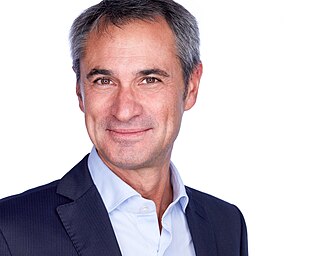
A Cartesian coordinate robot is an industrial robot whose three principal axes of control are linear and are at right angles to each other. The three sliding joints correspond to moving the wrist up-down, in-out, back-forth. Among other advantages, this mechanical arrangement simplifies the robot control arm solution. It has high reliability and precision when operating in three-dimensional space. As a robot coordinate system, it is also effective for horizontal travel and for stacking bins.

Dario Floreano is a Swiss-Italian roboticist and engineer. He is Director of the Laboratory of Intelligent System (LIS) at the École Polytechnique Fédérale de Lausanne in Switzerland and was the founding director of the Swiss National Centre of Competence in Research (NCCR) Robotics.

Computer-integrated manufacturing (CIM) is the manufacturing approach of using computers to control the entire production process. This integration allows individual processes to exchange information with each part. Manufacturing can be faster and less error-prone by the integration of computers. Typically CIM relies on closed-loop control processes based on real-time input from sensors. It is also known as flexible design and manufacturing.

A reconfigurable manufacturing system (RMS) is one designed at the outset for rapid change in its structure, as well as its hardware and software components, in order to quickly adjust its production capacity and functionality within a part family in response to sudden market changes or intrinsic system change.
Incremental sheet forming is a sheet metal forming technique where a sheet is formed into the final workpiece by a series of small incremental deformations. However, studies have shown that it can be applied to polymer and composite sheets too. Generally, the sheet is formed by a round tipped tool, typically 5 to 20mm in diameter. The tool, which can be attached to a CNC machine, a robot arm or similar, indents into the sheet by about 1 mm and follows a contour for the desired part. It then indents further and draws the next contour for the part into the sheet and continues to do this until the full part is formed. ISF can be divided into variants depending on the number of contact points between tool, sheet and die. The term Single Point Incremental Forming (SPIF) is used when the opposite side of the sheet is supported by a faceplate and Two Point Incremental Forming (TPIF) when a full or partial die supports the sheet.
Johann Borenstein is an Israeli roboticist and Professor at the University of Michigan. Borenstein is well known for his work in autonomous obstacle avoidance, and is credited with the development of the Vector Field Histogram.
Naomi Ehrich Leonard is the Edwin S. Wilsey Professor of Mechanical and Aerospace Engineering at Princeton University. She is the director of the Princeton Council on Science and Technology and an associated faculty member in the Program in Applied & Computational Mathematics, Princeton Neuroscience Institute, and the Program in Quantitative and Computational Biology. She is the founding editor of the Annual Review of Control, Robotics, and Autonomous Systems.

Hendrik (Rik) Van Brussel is a Belgian emeritus professor of mechanical engineering of the KU Leuven, world-renowned for his research on robotics, mechatronics and holonic manufacturing systems.
CH is a proprietary cross-platform C and C++ interpreter and scripting language environment. It was originally designed by Harry Cheng as a scripting language for beginners to learn mathematics, computing, numerical analysis, and programming in C/C++. Ch is now developed and marketed by SoftIntegration, Inc., with multiple versions available, including a freely available student edition, and a CH Professional Edition for Raspberry Pi which is free for non-commercial use.
Bradley James Nelson is an American roboticist and entrepreneur. He has been the Professor of Robotics and Intelligent Systems at ETH Zurich since 2002 and is known for his research in microrobotics, nanorobotics, and medical robotics.
Shixin Jack Hu is the senior vice president for academic affairs and provost at the University of Georgia. He is also the UGA Foundation Distinguished Professor in the school of environmental, civil, agricultural, and mechanical engineering in the UGA College of Engineering.
John William Sutherland is professor and Fehsenfeld Family Head of Environmental and Ecological Engineering (EEE) at Purdue University who specializes in the application of sustainability principles to design, manufacturing, and other industrial issues.

Shraga Shoval is an Israeli professor in the Department of Industrial Engineering & Management and the Dean of the Engineering Faculty at Ariel University

Silvia Ferrari is an Italian-American aerospace engineer. She is John Brancaccio Professor at the Sibley School of Mechanical and Aerospace Engineering at Cornell University and also the director of the Laboratory for Intelligent Systems and Control (LISC) at the same university.

Chinedum (Chi) Okwudire is a Nigerian-American mechanical engineer and a professor of Mechanical Engineering and Miller Faculty Scholar at the University of Michigan, where he directs the Smart and Sustainable Automation Research Lab. He is also the founder and chief technology officer of Ulendo Technologies, Inc. His research is in the area of manufacturing automation, control engineering, and mechatronics.
Dawn Marie Tilbury is an American control theorist whose research topics include logic control, networked control systems, robotics, human–machine systems, and autonomous vehicles. She is a professor of mechanical engineering and of electrical engineering and computer science at the University of Michigan, and the head of the directorate for engineering at the National Science Foundation.

Ali Galip Ulsoy is an academic at the University of Michigan (UM), Ann Arbor, where he is the C.D. Mote Jr. Distinguished University Professor Emeritus of Mechanical Engineering and the William Clay Ford Professor Emeritus of Manufacturing.

Stephen Malkin was an American engineer. He taught at the University of Texas at Austin, the University at Buffalo, the University of Massachusetts Amherst, and Technion – Israel Institute of Technology.

Moshe Shoham is a professor emeritus in the faculty of mechanical engineering at the Technion - Israel Institute of Technology.
Bernard Friedland is an American professor of engineering. He is Distinguished Professor of Electrical and Computer Engineering at the New Jersey Institute of Technology.











